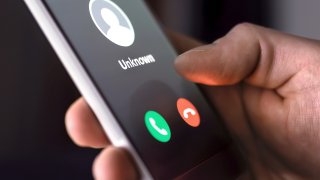
While Texans continue to repair and rebuild after the dangerously cold weather, FEMA warns scammers may try to capitalize on the disaster and offers the following tips to avoid becoming a victim.
The agency says con artists, identity thieves, and other criminals often try to take advantage of storm victims.
Phony housing inspectors, fraudulent building contractors, bogus pleas for disaster donations, fake offers of municipal or federal aid, or charging for free services are just a few of the examples of ways individuals can be scammed, FEMA said.
The warning comes two days after President Joe Biden partially approved the state's request for a major disaster declaration for individual assistance, but only for 77 of the state's 254 counties.
Get DFW local news, weather forecasts and entertainment stories to your inbox. Sign up for NBC DFW newsletters.
Several North Texas counties were included in the 77-county approval, including Collin, Dallas, Denton, Ellis Hood, Johnson, Kaufman, Tarrant and Wise. To apply for federal assistance, and see a complete list of approved counties, visit disasterassistance.gov and click on Texas on the map. For those in any of the 177 counties not currently approved for individual assistance, state officials said it was very important those Texans fill out the state's damage assessment report which will be used to hopefully secure more federal relief.
With federal help comes the potential for funds for repairs and with that comes the risk of being victimized. Below is guidance from FEMA on how to prevent being taken advantage of with some do's and don'ts to help keep your pockets safe:
Do: Research to find a contractor. This can help weed out scam artists who typically offer their services. Individuals can use internet search engines or tools like www.bbb.org.
Local
The latest news from around North Texas.
Do: Get repair estimates from your insurance company and multiple contractors.
Do: Ask for references from past customers.
Do: Make sure contractors have necessary permits, proper licensing and verify their insurance.
Do: Take pictures of the contractor, their business card, driver's license, vehicle, and license plate. Ask for identification if someone claims to be a representative of FEMA or another government agency.
Do: Question any offer that sounds too good to be true.
Do: Get agreements in writing, and take time to read over the contract. If you don't understand something or need more assistance- talk to an expert.
Do: Look out for these details on the contract: costs, projected completion date, negotiating changes, and settling disputes.
Do: Take your time making decisions with Texas contractors. Individuals can utilize a Notice of Cancelation, which allows for individuals to cancel within three days if they change their mind about a transaction.
Do: Demand satisfaction, individuals should hold on to their last payment and signature until everything is complete and done correctly.
Don't: Wire money or pay with reloadable debit cards or gift cards. There is no legitimate reason to use that payment method.
Don't: Offer financial information over the phone. Again, always ask for identification.
Don't: Sign a contract with blank spaces
FEMA urges individuals to know that scams can happen anywhere: over the phone, by mail or email, through the internet or in person.
Individuals with concerns or a potential fraud report can contact local authorities, the Texas Office of the Attorney General at 800-621-0508, and/or the FEMA Disaster Fraud Hotline at 866-720-5721.



